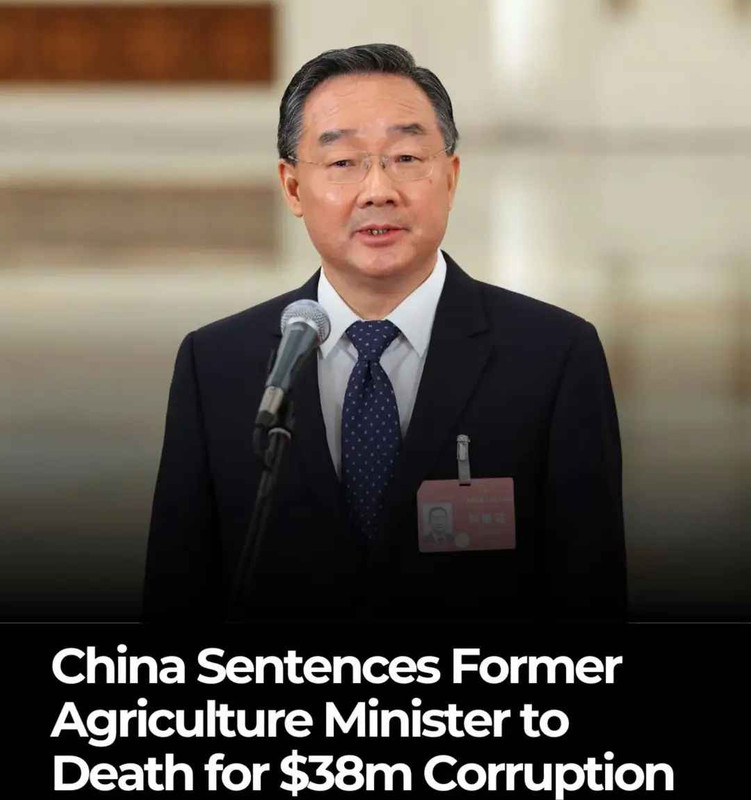Must Read
China has announced one of its biggest corruption punishments in recent years. Tang Renjian, the former Minister of Agriculture and Rural Affairs, has been sentenced to death with a two-year delay before the punishment can be carried out. The judgement was made on Sunday, twenty-eighth of September, two thousand and twenty-five, by the Changchun Intermediate People’s Court in Jilin Province. Read Our Last Post: Grieving Mother Collapses and Dies at Her Daughter’s Funeral
The court explained that Tang collected cash, gifts, and property worth more than two hundred and sixty-eight million yuan, which is about thirty-eight million dollars. The judges said his actions caused very serious damage to the country and the people, especially those in rural communities who depended on fair farming policies.
Tang is sixty-three years old. He began his career in farming and agriculture in the early nineteen eighties. In nineteen ninety-one, he joined the Communist Party of China and continued to move up the ladder in different agricultural offices.
By 2017, he had become the governor of Gansu Province, a very dry area where farmers often struggle with land and water. He worked there until two thousand and twenty when he was appointed Minister of Agriculture and Rural Affairs in Beijing. In that position, he was in charge of making policies about food, land, seeds, and farming across the whole country.
While he was seen in public as a hardworking official, investigations later showed that during those same years, he was quietly taking huge bribes in exchange for giving out contracts, helping businesses win projects, and promoting some people to better positions.
The bribery lasted for a long period, from two thousand and seven until two thousand and twenty-four. The court records showed that Tang used his power to influence big projects such as dams, seed factories, and land development. He accepted money in cash, houses, and even plots of land. These deals gave him personal wealth but left the state with weak projects and wasted resources. Farmers and citizens ended up suffering from poor services and increased costs.
His troubles started in May two thousand and twenty-four, when the party’s anti-corruption team began investigating him. In November of that year, he was expelled from the Communist Party and lost his government job.
By April two thousand and twenty-five, he was formally charged with bribery, and in July his trial took place in Changchun. During the trial, prosecutors presented evidence of the money and properties he had taken, while Tang himself admitted guilt and apologised for his actions.
The court explained that the punishment of death with a two-year suspension is common in China for very serious crimes. If Tang behaves well in prison and shows more cooperation, the sentence may later be reduced to life imprisonment. If not, the death penalty can be carried out after the two years. The judges said his confession and his cooperation in the investigation were the reasons he was given the suspended form of death sentence rather than immediate execution.
The news of the ruling spread quickly across China. On Weibo, the country’s popular social media platform, many users said they were shocked by the size of the bribes but agreed with the strong punishment. Some said it shows that no official is too powerful to face justice. In Beijing and Shanghai, people interviewed by reporters said they hope the case will remind leaders to act honestly, especially those in charge of food and farming.
The case also caught attention outside China. International media such as Reuters, The New York Times, and The Straits Times carried the story, describing it as one of the largest bribery cases under China’s President Xi Jinping’s anti-corruption campaign. Groups such as Transparency International said the quick judgement sends a strong message, but they also called for more open trials to make the process clearer to the public.
For now, Tang is being held in Jilin Province while the two-year waiting period begins. The final decision on whether he spends the rest of his life in prison or faces execution will depend on his behaviour during that time. The case remains one of the most talked-about corruption trials in recent Chinese history, and many people are watching closely to see what happens next.
-Picsart-AiImageEnhancer.jpeg.png)


